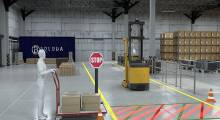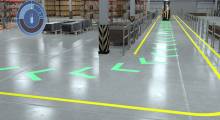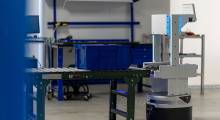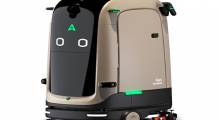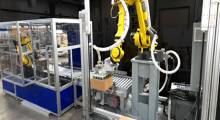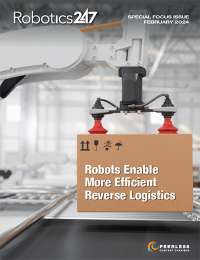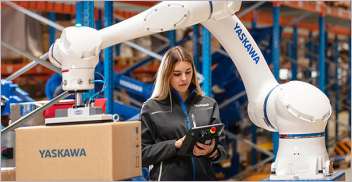Locus Robotics Corp. today broke ground for its new global headquarters near Boston. The company said the new facility in Wilmington, Mass., will serve as the hub for its growing global operations and will provide room for future expansion.
“We're thrilled to break ground on our new headquarters in Wilmington,” stated Rick Faulk, CEO of Locus Robotics, in a release. “This is a significant milestone that reflects our robust growth trajectory and our dedication to revolutionizing the warehouse automation sector with cutting-edge, AI-driven robotics solutions.”
Spinning out of Quiet Logistics in 2014, Locus offers autonomous mobile robots (AMRs) that collaborate with human workers to improve productivity by as much as two to three times. The company said its award-winning AMRs and software support more than 100 top brands and are deployed at over 250 sites around the world. It passed 1 billion picks last September.
The LocusONE Warehouse Automation Platform, announced at ProMat 2023, is designed to manage robotic task allocation, route planning, and resource use, while delivering real-time insights into warehouse operations. Locus claimed that it empowers shorthanded third-party logistics (3PL), retail, healthcare, and manufacturing businesses to optimize productivity, reduce costs, and stay competitive in the rapidly evolving e-commerce landscape.
Faulk spoke with Robotics 24/7 about Locus Robotics' new headquarters and its strategy for the future.
Locus prepares to make its move
What made you decide to build a new headquarters?
Faulk: We're currently in five different buildings in the Boston area, which led to inefficiencies. By centralizing operations, we can improve communications and foster a stronger corporate culture.

Secondly, we wanted to have a place to showcase our products and support center. New clients typically visit us, and we want to show them our technologies. We'll have specialized labs, testing, and manufacturing all under one roof, and this allows us to customize our infrastructure.
Underlying all that is we want to attract and retain talent. With a comfortable space and the most advanced tools, workers will have more satisfaction and be more productive.
Another big reason is that we're building a big refurbishment center in the facility as part of our commitment to sustainability. As it happens, Locus Park will be next door to an Amazon facility.
What will happen to your existing facilities?
Faulk: The lease on our main building in Wilmington expires in Q1, so we'll be moving sometime in the spring [of 2024]. The other scattered leases will end in the next year or so, giving us the flexibility to get down to one facility.
The new building is already going up near I-93. It's an eighth of a mile long, and we're making a lot of progress. We expect to open on time.
The Massachusetts talent pool
What's Locus Robotics' existing headcount, and do you expect to hire more staffers once you move?
Faulk: We're at around 500 employees now, with over half in greater Boston. We'll add close to another 100 in the next year or so, close to half of them again in Boston.
What are some of the benefits of staying in Massachusetts?
Faulk: We can attract top talent. With all the universities in the area, Boston is a hub for robotics and technology. MassRobotics has been a big step toward creating that. We're creating a lot of robotics jobs in the Boston area, which is good for regional economic growth.
Cultural diversity also helps in thinking about the business and creating innovations. The location is also strategic—you can get to Europe and Asia with a nonstop flight.
In addition, we have a big internship program. Our new building will be very accessible, and we'll be expanding the program aggressively. Locus will provide opportunities for college and even high school students.
LocusONE part of ongoing innovation
The past year has been challenging for providers of supply chain automation. How do you see the market?
Faulk: Tens of thousands of buildings need automation, and less than 5% have been automated. There's 7 billion sq. ft. of new warehouse space coming over the next several years, and it will happen.
There has been an increasing focus on brownfield buildings right now—companies are looking at being more efficient when volumes are uncertain. This plays to our strengths; we're one of the few players that can easily automate brownfields.
Are you focusing on enhancing your existing LocusONE technologies, or are you developing new systems?
Faulk: We're working on a host of things. LocusONE differentiates us in the market, and we always want to make it better.
Our Origin, Max, and Vector robots all run on LocusONE, and we've invested heavily in AI before it was fashionable. Robots moving around buildings have to talk to one another, and we're dramatically beefing up that effort.
We're looking at conversational dashboards and more predictive analytics. I've been saying, “Locus Park is the house that AI built.”
We have a big data scientist team and a big AI team, and Locus is a leader in bringing AI to collaborative robotics.
Locus acquired Waypoint Robotics in 2021. How do Vector and Max fit into your AMR portfolio?
Faulk: Vector is now generally available along with Origin. It's totally configurable, with different shelving, movable carts, and a base that can handle different accessories.
Our robots allow us to execute our “3 to 3 strategy”—from 3 oz. to 3,000 lb. With one vendor, customers can pick a wide range of things, all with the LocusONE platform. They can give us their whole order pools.
With our new corporate headquarters, clients can come in and see all our products and know that they're dealing with an enterprise-grade supplier that will go the distance with them.
About the Author
Follow Robotics 24/7 on Linkedin
Article topics
Email Sign Up




